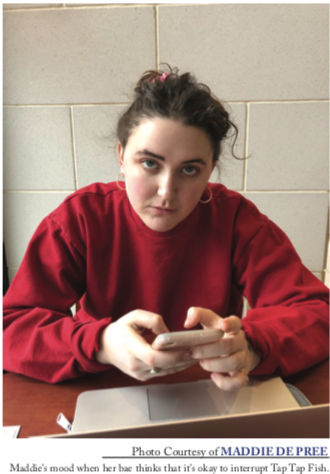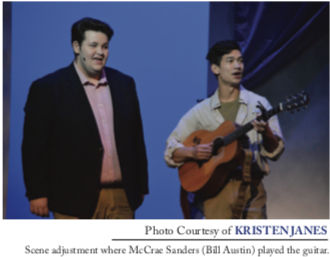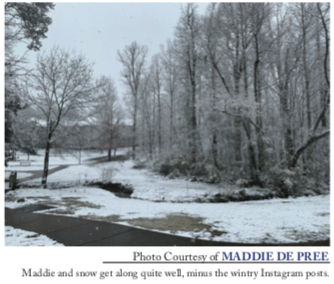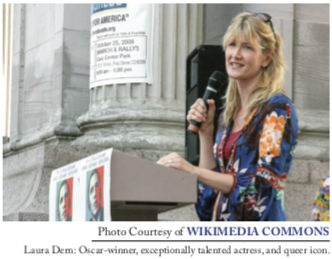By Thomas Stubbs
William Shakespeare is alive, dear reader.
I saw him the night of March 29 at the Furman Playhouse. We had met before, in tedious English classes and insufferable Baz Luhrmann films, but he’d looked old then, out of touch and out of time, a fading icon whose best days had passed him by. That evening, however, with the Furman Theatre’s triumphant production of “Romeo and Juliet,” The Bard was in no mood to phone it in. He took back the stage with a vengeance, and held it with the white-hot intensity of a young man with something to prove, who wouldn’t be satisfied until he’d laid himself bare beneath the glaring spotlight.
This is Shakespeare the way he was meant to be experienced: prescient, entertaining and supremely affecting. I cannot heap enough praise upon the company for its incredible achievement. All involved have clearly given their best effort, and the high caliber of each department’s creative contribution showed up in every superbly crafted moment.
Co-Directors Maegan and Thomas Azar have re-imagined Shakespeare’s Verona as a latter-day war zone — some ungodly mixture of Syria, Bosnia, and Nazi Germany — re-casting the Montagues and Capulets as warlords whose fighting threatens to tear what’s left of the city apart. Alan Bryson’s set looks like the bombed-out palace of some third-world dictator, populated by characters clad in military uniforms, leather dusters and combat boots, who run in and out of the story brandishing frightfully realistic machine guns. Paradoxically, turning Verona into a city of extremes had a way of normalizing the proceedings; this is the kind of place where love is worth dying — and killing — for.
Taking their cues from this idea, Lighting Designer Taylor Jensen and Sound Designer Lauren Girouard have both done an excellent job of keeping tensions and passions high. Strobe effects add punch to the show’s moments of hand-to-hand combat, perfectly complementing Thomas Azar’s cinematic fight choreography, and lighting is responsible for many of the gorgeous and powerful stage images scattered throughout. I was floored by an incredible moment when a back-lit Romeo steps between two of the set’s columns and turns into a stoic silhouette, his outline and that of his firearm set stark and pitch-black against the pale brightness. The music, meanwhile, works to up the contrast between the frenzied terror of the play’s conflict and the quiet, tender moments of Romeo and Juliet’s courtship. Wistful, romantic melodies underscore the fleeting moments of peace our hero and heroine share together, before being rudely interrupted by the screaming guitars and pounding drums that characterize the disorienting world around them.
All these triumphs of design provide an incredible theatrical landscape for the actors, who inhabit it fully and fearlessly. Any production of “Romeo and Juliet” lives or dies by the performances of the actors playing the titular characters, and here the production absolutely thrives. Drake Shadwell’s Romeo is a livewire start to finish. He does an excellent job setting up Romeo’s ultimate fate as something of an inevitability, playing the character like so many of the angry young men whose uncontrollable passions took them from the world too soon. Likewise, Dayanari Umana’s Juliet exudes tenacity and humanity. Before this production, it hadn’t occurred to me how fully Juliet drives the play’s narrative, but Umana’s performance emphasizes the character’s wit and resilience. Juliet is the play’s great problem-solver, willing to be flirtatious, violent and submissive if it serves her ends, always looking to untangle herself from the web of other people’s interests that threatens to trap her forever.
There are great performances to be found everywhere, though. The entire cast has done a marvelous job bringing Shakespeare’s words to life. No glorified poetry recitation is this. The actors dig deep in search of the emotional bedrock underpinning every line, finding the humor, hatred and heartache that elevate Shakespeare’s words from emulsified couplets to peerless reflections upon the human soul. Nothing sounds stilted or artificial (Well, almost nothing: at the moment of his death, Cody Evins’ Paris is made to recite the one Shakespeare line that you really cannot do a darn thing with: “I am slain.”).
This show was for everyone who’s ever had to struggle through a print copy of “Romeo and Juliet,” trying not to drown in a sea of words that are often beautiful and clever, but nigh impossible to find relatable without the transformative medium of performance. If you’ve ever wondered of Shakespeare and his work, “What was this guy trying to say and why do people still care?”, it is productions like this that provide the best answer, because they make it seem that The Bard is there, in the theatre, telling you himself.






























